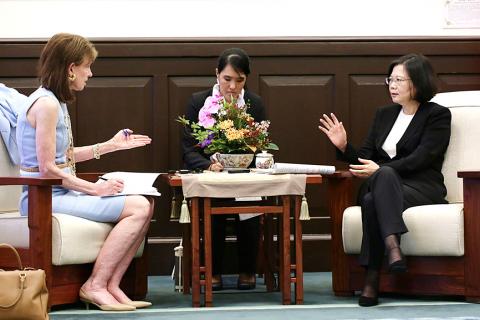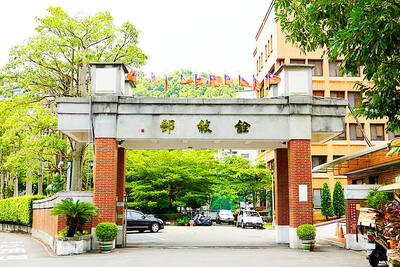President Tsai Ing-wen (蔡英文), for the first time since her inauguration, implicitly dismissed the so-called “1992 consensus” in an interview with the Washington Post, saying it is unlikely that her government would agree to a deadline for accepting conditions that go against the public’s will.
Tsai gave her first exclusive interview since taking office with Washington Post senior associate editor Lally Weymouth at the Presidential Office Building on Monday, with the president talking at length about cross-strait ties and the Taiwan-US relationship.
“I am certain that as a national leader, [Chinese President] Chairman Xi Jinping (習近平) is equipped with the ability to make a good and a right decision based on a comprehensive review of all the situations,” Tsai said when asked to verify reports that Xi has set a deadline for her to accept the “1992 consensus.”

Photo: CNA, courtesy of the Office of the President
Tsai said that given Taiwan has evolved into a mature democracy, where trends in public opinion matter greatly, it is unlikely that the government would accede to conditions set by the other side that are against the will of the people.
“I believe that they [Chinese authorities] are aware of this,” Tsai said.
The “1992 consensus,” a term former Mainland Affairs Council (MAC) chairman Su Chi (蘇起) admitted making up in 2000, refers to a tacit understanding between the Chinese Nationalist Party (KMT) and the Chinese government that both sides of the Strait acknowledge there is “one China,” with each side having its own interpretation of what “China” means.
Tsai has so far merely expressed respect for the “1992 talks.”
Praising Xi’s courage in tackling corruption as being conducive to the development of Chinese society, Tsai said she hoped that Xi could “show a bit more flexibility” in dealing with cross-strait relations and appreciate Taiwan’s democracy.
With regard to her plans for handling ties with Beijng amid a reported decrease in official cross-strait communications, Tsai said there are diverse channels of communication across the Taiwan Strait, including official links and person-to-person ties.
“There are differences between the positions held on either side of the Strait. In Taiwan, we have done our best to minimize that gap. I believe that the Chinese realize the goodwill we put forth at the inauguration,” Tsai said.
However, she declined to go into much detail when asked whether she is in touch with Chinese government officials, saying only that different levels of government have a variety of ways to communicate with their counterparts in Beijing.
Weymouth asked Tsai how she plans to strike a balance between maintaining cross-strait stability and responding to the expectations of her younger supporters, most of whom identify themselves as “Taiwanese” rather than “Chinese” and are perceived as champions of Taiwanese independence.
“It is a fact that different generations — and different people of different ethnic origins — have different views on China,” Tsai said. “However, they all agree on one thing: That is democracy.”
China’s Taiwan Affairs Office (TAO) spokesman Ma Xiaoguang (馬曉光) yesterday said that the maintenance of peaceful cross-strait development is supported by mainstream public opinion on both sides of the Taiwan Strait.
“Only by adhering to the 1992 consensus and its core meaning — that both sides belong to one China — can peaceful development of cross-strait ties be ensured,” Ma said.
Ma said that the communication mechanism between the TAO and the MAC, as well as between the semi-official Straits Exchange Foundation and its Chinese counterpart, the Association for Relations Across the Taiwan Straits, are both built on the “1992 consensus.”

Taiwan Semiconductor Manufacturing Co (TSMC, 台積電) is expected to start construction of its 1.4-nanometer chip manufacturing facilities at the Central Taiwan Science Park (CTSP, 中部科學園區) as early as October, the Chinese-language Liberty Times (the Taipei Times’ sister newspaper) reported yesterday, citing the park administration. TSMC acquired land for the second phase of the park’s expansion in Taichung in June. Large cement, construction and facility engineering companies in central Taiwan have reportedly been receiving bids for TSMC-related projects, the report said. Supply-chain firms estimated that the business opportunities for engineering, equipment and materials supply, and back-end packaging and testing could reach as high as

CHAMPIONS: President Lai congratulated the players’ outstanding performance, cheering them for marking a new milestone in the nation’s baseball history Taiwan on Sunday won their first Little League Baseball World Series (LLBWS) title in 29 years, as Taipei’s Dong Yuan Elementary School defeated a team from Las Vegas 7-0 in the championship game in South Williamsport, Pennsylvania. It was Taiwan’s first championship in the annual tournament since 1996, ending a nearly three-decade drought. “It has been a very long time ... and we finally made it,” Taiwan manager Lai Min-nan (賴敏男) said after the game. Lai said he last managed a Dong Yuan team in at the South Williamsport in 2015, when they were eliminated after four games. “There is

Democratic nations should refrain from attending China’s upcoming large-scale military parade, which Beijing could use to sow discord among democracies, Mainland Affairs Council Deputy Minister Shen You-chung (沈有忠) said. China is scheduled to stage the parade on Wednesday next week to mark the 80th anniversary of Japan’s surrender in World War II. The event is expected to mobilize tens of thousands of participants and prominently showcase China’s military hardware. Speaking at a symposium in Taichung on Thursday, Shen said that Chinese Minister of Foreign Affairs Wang Yi (王毅) recently met with Indian Prime Minister Narendra Modi during a visit to New Delhi.

FINANCES: The KMT plan to halt pension cuts could bankrupt the pension fund years earlier, undermining intergenerational fairness, a Ministry of Civil Service report said The Chinese Nationalist Party (KMT) caucus’ proposal to amend the law to halt pension cuts for civil servants, teachers and military personnel could accelerate the depletion of the Public Service Pension Fund by four to five years, a Ministry of Civil Service report said. Legislative Speaker Han Kuo-yu (韓國瑜) on Aug. 14 said that the Act Governing Civil Servants’ Retirement, Discharge and Pensions (公務人員退休資遣撫卹法) should be amended, adding that changes could begin as soon as after Saturday’s recall and referendum. In a written report to the Legislative Yuan, the ministry said that the fund already faces a severe imbalance between revenue